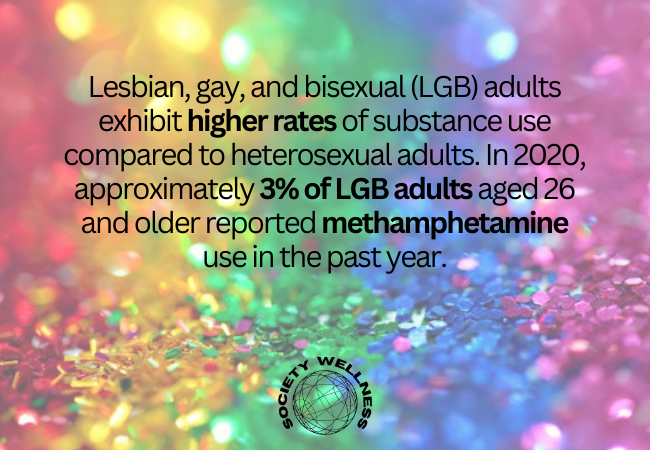Methamphetamine addiction is a growing crisis across the United States, and its impact on the LGBTQ+ community is particularly concerning. Factors such as societal discrimination, minority stress, and cultural acceptance of methamphetamine in certain LGBTQ+ social circles contribute to disproportionately high rates of use. Understanding the risks of meth addiction and accessing inclusive, affirming care is critical for recovery.
At LGBTQ Addiction Centers, we specialize in addressing these challenges through tailored programs like LGBTQ Meth Addiction Treatment. This blog explores the methamphetamine addiction crisis, its unique impact on LGBTQ+ individuals, and the comprehensive recovery options available.
Understanding the Methamphetamine Addiction Crisis
Methamphetamine addiction is a growing epidemic in the United States, with devastating effects on individuals and communities. Among LGBTQ+ populations, meth use is disproportionately high due to unique social and cultural factors. Meth is often associated with short-term euphoria, increased energy, and heightened sociability, but the long-term consequences are severe.
National Statistics on Methamphetamine Addiction
- Approximately 2.5 million Americans report using meth annually, with over 23,000 meth-related deaths reported in 2021.
- LGBTQ+ individuals, particularly gay and bisexual men, are four to five times more likely to use meth than their heterosexual counterparts.
Why Meth is Prevalent in LGBTQ+ Communities
- Social Contexts: Meth use is often tied to party scenes and “chemsex” environments, which normalize substance use.
- Coping Mechanisms: Discrimination, stigma, and minority stress lead some LGBTQ+ individuals to turn to meth as an escape.
- Accessibility: Meth is relatively inexpensive and widely available, making it a tempting option for individuals under financial strain.
The Crisis of Methamphetamine Addiction in the LGBTQ+ Community
Why Meth Use is Prevalent in LGBTQ+ Populations
Methamphetamine use is more common in LGBTQ+ communities than in the general population. Several factors contribute to this trend:
- Coping with Minority Stress: Many LGBTQ+ individuals face stigma, discrimination, and family rejection, leading to increased substance use as a coping mechanism.
- Social Settings: Methamphetamine is often used in LGBTQ+ party scenes or as part of “chemsex” culture, which links substance use with sexual activity.
- Mental Health Challenges: Higher rates of anxiety, depression, and PTSD in LGBTQ+ populations increase vulnerability to methamphetamine addiction.
Statistics on Methamphetamine Use
- Studies show that gay and bisexual men are four to five times more likely to use meth than heterosexual men.
- The Substance Abuse and Mental Health Services Administration (SAMHSA) reports that LGBTQ+ individuals are more likely to engage in binge use and experience substance use disorders.
The Effects of Methamphetamine on the Body and Mind
Methamphetamine addiction has devastating consequences that affect both physical health and mental well-being. Understanding these effects underscores the importance of seeking professional help.
Physical Effects
- Neurological Damage: Long-term meth use damages dopamine receptors, impairing the brain’s reward system. This leads to reduced pleasure, memory loss, and cognitive decline.
- Cardiovascular Issues: Meth raises heart rate and blood pressure, increasing the risk of heart attack and stroke.
- Dental Problems: Commonly known as “meth mouth,” severe tooth decay and gum disease result from meth use.
- Weakened Immune System: Meth suppresses immune function, making users more susceptible to infections.
Mental Health Effects
- Psychosis: Meth use often triggers paranoia, hallucinations, and delusions.
- Mood Disorders: Depression, anxiety, and emotional instability are common during and after meth use.
- Suicidal Ideation: The psychological toll of meth addiction can lead to feelings of hopelessness and suicidal thoughts.
Recognizing Methamphetamine Addiction
Identifying methamphetamine addiction early is critical for intervention. Signs of addiction include:
- Persistent cravings and inability to control use.
- Erratic behavior, mood swings, and paranoia.
- Physical symptoms such as extreme weight loss, open sores, and dental decay.
- Social withdrawal, neglect of responsibilities, and financial troubles.
If you or someone you know exhibits these signs, LGBTQ Meth Addiction Treatment at LGBTQ Addiction Centers offers a safe, affirming pathway to recovery.
Specialized Treatment for Meth Addiction in LGBTQ+ Communities
Recovering from meth addiction is possible with the right support. LGBTQ-specific programs provide a tailored approach that addresses both the physical and emotional aspects of addiction.
1. LGBTQ Day Treatment Program
This program provides structured, full-day treatment, allowing individuals to return home in the evenings.
- Includes medical detox to manage withdrawal symptoms safely.
- Offers individual and group therapy tailored to LGBTQ+ experiences.
- Incorporates holistic practices like mindfulness and physical wellness activities.
2. LGBTQ Night Treatment Program
For those who work or have daytime commitments, this program offers evening sessions focused on recovery.
- Provides flexible care while maintaining access to professional support.
- Addresses addiction triggers specific to LGBTQ+ individuals.
3. LGBTQ Evening Outpatient Program
This option supports individuals transitioning from intensive care or managing mild addiction.
- Offers therapy, relapse prevention strategies, and peer support in a flexible schedule.
- Helps build skills for long-term sobriety.
Why LGBTQ-Specific Treatment Matters
Traditional rehab programs often fail to address the unique challenges faced by LGBTQ+ individuals. At LGBTQ Addiction Centers, we provide affirming care that meets these needs.
Affirming Environments
Our programs are designed to create a safe space where LGBTQ+ individuals can focus on recovery without fear of judgment. This includes culturally competent staff and inclusive therapy sessions.
Integrated Care
We address both addiction and co-occurring mental health disorders like depression and PTSD, ensuring a comprehensive recovery process.
Community Support
Peer support in LGBTQ-specific programs fosters a sense of belonging and shared understanding, crucial for sustained recovery.
Steps to Recovery from Meth Addiction
- Acknowledge the Problem: Recognizing meth addiction is the first step toward recovery.
- Seek Professional Help: Programs like LGBTQ Substance Abuse Treatment provide the tools and support necessary for healing.
- Commit to Sobriety: Staying in a structured program helps individuals navigate the challenges of early recovery.
- Engage in Aftercare: Ongoing therapy and peer support prevent relapse and build resilience.
The Unique Challenges LGBTQ+ Individuals Face in Recovery
The road to recovery is never easy, and LGBTQ+ individuals often face additional obstacles that make the process more complex.
1. Minority Stress and Discrimination
Many LGBTQ+ individuals experience discrimination, rejection, or marginalization, which can drive substance use as a way to cope. These external pressures continue into recovery, making relapse more likely without proper support.
2. Intersectionality
For LGBTQ+ individuals who also belong to racial or ethnic minorities, or who face economic disadvantages, overlapping forms of discrimination compound the challenges of recovery.
3. Stigma in Traditional Rehab Settings
Conventional addiction treatment programs may not address the unique needs of LGBTQ+ individuals, leaving them feeling isolated or misunderstood. Programs like the LGBTQ Day Treatment Program and LGBTQ Night Treatment Program provide affirming, inclusive environments where individuals can focus on healing.
4. Mental Health Co-Occurrences
LGBTQ+ individuals are more likely to experience co-occurring mental health disorders like depression, anxiety, and PTSD, which complicate recovery if not properly addressed.
The Science of Methamphetamine Addiction
Methamphetamine is a powerful stimulant that profoundly affects the brain and body. Understanding its impact helps to underscore the need for comprehensive, science-backed treatment.
1. How Meth Affects the Brain
- Dopamine Flood: Meth triggers an intense release of dopamine, the brain’s pleasure chemical, leading to euphoria. Over time, this depletes natural dopamine stores, impairing the brain’s ability to regulate mood and motivation.
- Structural Damage: Chronic meth use damages brain regions responsible for memory, decision-making, and emotional regulation.
- Psychosis: Long-term use can cause paranoia, hallucinations, and delusions, often resembling schizophrenia.
2. Physical Effects
- Cardiovascular Issues: Meth raises heart rate and blood pressure, increasing the risk of heart attack and stroke.
- “Meth Mouth”: Severe tooth decay and gum disease result from the drug’s effects and poor hygiene.
- Weakened Immunity: Meth use suppresses the immune system, making users more vulnerable to infections.
3. Recovery Potential
While some damage may be permanent, the brain and body have an incredible capacity to heal. Through structured care in LGBTQ Meth Addiction Treatment, individuals can regain physical and mental health over time.
Steps to Prevent Relapse After Methamphetamine Addiction
Relapse prevention is a critical component of long-term recovery, especially for methamphetamine addiction. Here are actionable steps to reduce the risk of relapse:
1. Build a Support Network
Surround yourself with understanding and supportive individuals, including peers in LGBTQ-specific recovery groups. Programs like the LGBTQ Evening Outpatient Program provide ongoing peer support.
2. Develop Coping Mechanisms
Learn to identify and manage triggers through strategies like:
- Mindfulness and meditation.
- Journaling to process emotions.
- Engaging in physical activity to reduce stress.
3. Stay Engaged in Treatment
Continuing therapy through outpatient programs or aftercare services is essential. Regular counseling sessions address new challenges and keep recovery on track.
4. Focus on Health and Wellness
- Nutrition: Prioritize a diet rich in proteins, antioxidants, and vitamins to rebuild physical health.
- Sleep: Establish healthy sleep routines to restore cognitive function and reduce stress.
- Exercise: Physical activity boosts mood, reduces cravings, and enhances overall well-being.
5. Plan for High-Risk Situations
Identify potential relapse triggers, such as social events or stressors, and create a plan to navigate these situations. Having an exit strategy or a supportive friend on call can make a significant difference.
6. Stay Connected
Engage in ongoing recovery programs like those offered at LGBTQ Addiction Centers. Peer groups, therapy, and continued support build resilience and accountability.
Conclusion
Methamphetamine addiction is a significant crisis that disproportionately impacts the LGBTQ+ community, intertwining issues of substance abuse with minority stress, stigma, and discrimination. The effects of methamphetamine on the brain and body are devastating, but recovery is possible with the right support and resources. At LGBTQ Addiction Centers, we recognize the unique challenges LGBTQ+ individuals face in their journey to sobriety, and we are dedicated to providing inclusive, affirming care tailored to meet these needs. Reach out to us at (888) 598-9510 to learn more about our specialized programs and how we can support your journey to recovery.
FAQs on Methamphetamine Addiction
Why is methamphetamine use higher in LGBTQ+ communities?
Factors like minority stress, stigma, and social acceptance of meth in certain LGBTQ+ circles contribute to its higher prevalence among LGBTQ+ individuals.
What are the signs of methamphetamine addiction?
Common signs include intense cravings, erratic behavior, weight loss, sores on the skin, paranoia, and neglect of responsibilities.
How does meth affect the body and mind?
Meth damages the brain’s dopamine system, causing cognitive decline and emotional instability. Physically, it can lead to heart issues, “meth mouth,” and a weakened immune system.
Can LGBTQ+ individuals benefit from specialized treatment?
Yes, LGBTQ Addiction Treatment Programs provide a safe and affirming environment to address the unique challenges LGBTQ+ individuals face in recovery.
What treatment options are available for LGBTQ+ individuals with meth addiction?
Programs like the LGBTQ Day Treatment Program, LGBTQ Night Treatment Program, and LGBTQ Evening Outpatient Program offer tailored support, including therapy, peer groups, and relapse prevention strategies.

